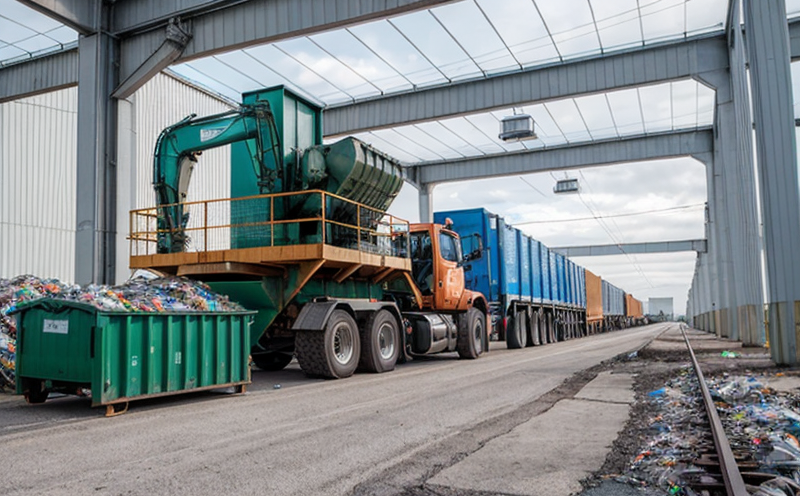ISO 22606 Textile Recycling Process Testing
The ISO 22606 standard provides a framework to ensure that textile recycling processes are sustainable and produce recycled fibers of consistent quality. This service focuses on the testing parameters, specimen preparation procedures, instrumentation used, and reporting criteria essential for compliance with ISO 22606.
At [Laboratory Name], we specialize in providing comprehensive ISO 22606 Textile Recycling Process Testing services that cater to the needs of industrial manufacturers involved in textile recycling. Our testing protocols are designed to meet industry standards and provide reliable, reproducible results. By adhering strictly to these guidelines, our clients ensure their processes are sustainable, efficient, and compliant with international standards.
Our team of experts ensures that all tests are conducted under controlled conditions using state-of-the-art equipment. This approach guarantees accurate and consistent results every time. We employ a range of advanced analytical techniques including near-infrared spectroscopy (NIRS), Fourier Transform Infrared Spectroscopy (FTIR), and scanning electron microscopy (SEM) to analyze the recycled fibers.
Specimen preparation is critical for obtaining reliable test results. Our team follows strict protocols to ensure that samples are representative of the batch they represent. This involves mechanical and chemical treatment methods tailored to the type of textile being recycled. Once prepared, these samples undergo rigorous testing to assess key parameters such as fiber length distribution, fineness, and tensile strength.
The results from our ISO 22606 Textile Recycling Process Testing are presented in detailed reports that include graphical representations of data trends over time. These visual aids help our clients better understand the performance of their recycling processes. Additionally, we provide recommendations for process optimization based on the test outcomes and industry best practices.
Our commitment to excellence extends beyond just compliance; it includes continuous improvement initiatives aimed at enhancing the sustainability aspects of textile recycling. By leveraging cutting-edge technology and robust quality control measures, we help our clients stay ahead in their respective markets.
To summarize, ISO 22606 Textile Recycling Process Testing is crucial for maintaining high standards within industrial manufacturing processes related to textile recycling. It ensures that recycled materials are fit-for-purpose, thereby promoting a more sustainable circular economy. Through meticulous testing and stringent quality controls, our services play an integral role in fostering innovation and sustainability across various sectors.
Industry Applications
The application of ISO 22606 Textile Recycling Process Testing is widespread across multiple industries where sustainable practices are becoming increasingly important. Here’s a breakdown:
- Textile Mills: Ensuring the quality and consistency of recycled fibers used in manufacturing.
- Fashion Brands: Meeting ethical sourcing standards while maintaining product quality.
- Retailers: Offering consumers eco-friendly clothing options that meet rigorous sustainability criteria.
- Agricultural Machinery Manufacturers: Developing biodegradable packaging solutions derived from textile waste.
| Industry | Description |
|---|---|
| Fashion | Incorporating recycled fibers into new collections to reduce environmental impact. |
| Textiles | Optimizing production processes for efficiency and sustainability. |
| Machinery Manufacturing | Evaluating the durability and performance of biodegradable materials used in packaging. |
Customer Impact and Satisfaction
Implementing ISO 22606 Textile Recycling Process Testing yields significant benefits for our customers. Here’s why:
- Innovation Drive: Our testing ensures that innovative textile recycling technologies are validated and optimized.
- Sustainability Leadership: Compliance with international standards enhances a company's reputation as an eco-friendly leader in its field.
- Better Quality Control: Rigorous testing helps identify potential issues early on, allowing for timely corrections.
- Market Access: Meeting stringent environmental regulations opens doors to new markets seeking sustainable products and services.
Our satisfied clients consistently report higher levels of customer satisfaction due to our commitment to delivering accurate, reliable testing results. We strive to exceed expectations by providing personalized support throughout the testing process.
Competitive Advantage and Market Impact
Adopting ISO 22606 Textile Recycling Process Testing offers substantial competitive advantages:
- Differentiation in a Crowded Market: By demonstrating leadership in sustainable practices, companies can stand out from competitors.
- Premium Pricing Power: Products made with recycled materials often command premium prices because they are perceived as environmentally friendly and socially responsible.
- Better Resource Management: Efficient recycling processes lead to reduced raw material costs and lower energy consumption, translating into cost savings.
- Regulatory Compliance: Keeping ahead of regulatory changes ensures that companies avoid costly penalties and maintain smooth operations.
The broader impact extends beyond individual businesses; it contributes positively towards global sustainability goals. By participating in the circular economy through sustainable recycling practices, industries contribute to reducing waste and conserving natural resources.





